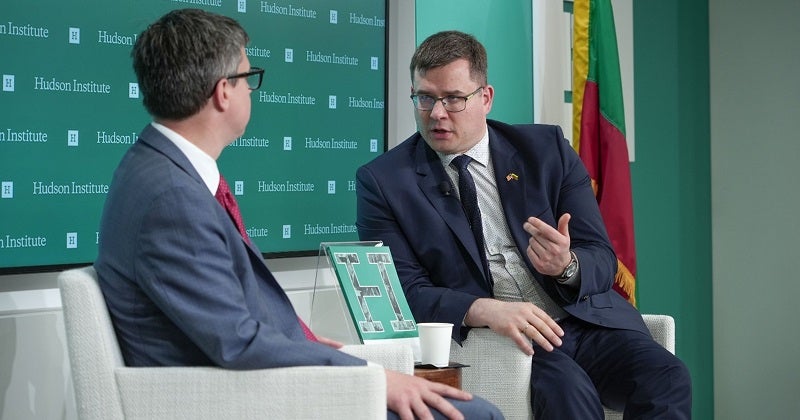
During his visit to the US, Laurynas Kasčiūnas, the Lithuanian Minister of National Defence (MoND), encouraged US defence industries to consider co-operating with his country’s fledgling, albeit promising defence industry.
According to GlobalData intelligence, Lithuania’s defence budget is forecast to grow to $2.8bn in 2029, from $2.1bn in 2024. This follows ongoing historical growth, with their defence budget registering a positive compound annual growth rate of 16.2% between 2020 and 2024.
“We can see immense potential in Lithuania-US co-operation in [the] defence industry,” Kasčiūnas suggested during a meeting with the US Under Secretary of Defense for Acquisition and Sustainment, William LaPlante.
“Therefore, we look forward to a signal [from] business that Lithuania is a reliable partner.”
During his encounter with LaPlante, Kasčiūnas reiterated Lithuania’s position as the largest US weaponry customer in the Baltic region, with the country having spent $1.3bn (€1.2bn) over an average period. This is only 20% of the planned defence acquisition currently happening, the MoND suggested.
“Therefore, we look forward to a signal [from] business that Lithuania is a reliable partner.”
Laurynas Kasčiūnas, the Lithuanian Minister of National Defence.How well do you really know your competitors?
Access the most comprehensive Company Profiles on the market, powered by GlobalData. Save hours of research. Gain competitive edge.
 Company Profile – free sample
Company Profile – free sampleThank you!
Your download email will arrive shortly
Not ready to buy yet? Download a free sample
We are confident about the unique quality of our Company Profiles. However, we want you to make the most beneficial decision for your business, so we offer a free sample that you can download by submitting the below form
By GlobalData
Not only that, but “equipment servicing and maintenance over its full life cycle doubles the amount,” the minister added.
Within this vast acquisition plan, Lithuania has ordered four UH-60M Black Hawk medium helicopters, with an option for two more down the line. The nation has also ordered HIMARS artillery systems, Javelin anti-tank systems, AMRAAM missiles, Switchblade uncrewed aerial systems (UAS) and 500 units of Joint Light Tactical Vehicles, among other things.
Institutional reform empowering defence
Kasčiūnas also managed to visit several US defence suppliers including the UAS manufacturer AEVEX Aerospace, defence giant Lockheed Martin (with whom the country has numerous orders for platforms and equipment), as well as the industry prime Northrop Grumman, the largest manufacturer of medium calibre live and dummy ammunition and defence systems in the world.
The legislative branch of the Lithuanian Government is currently in the process of instituting regulations that place greater importance on defence production, which will open more opportunities for local suppliers and cultivate co-operation with foreign defence industries.
This legislation is expected to come into effect by 1 July 2024.
Ahead of that, the country has already struck an agreement with the German arms manufacturer, Rheinmetall, to establish a new 155-millimetre ammunition factory in Lithuania.
This is due to be one of the largest investments made by Lithuania in the whole of the Baltic region – a fact the minister was quick to point out to LaPlante.
Support for Ukraine
Following news that the US has turned the money tap back on for Ukraine – after several months of political manoeuvring in Washington, which experts have suggested will have a negative impact on Ukraine’s Armed Forces in the near-term – Kasčiūnas was also eager to reinforce Ukraine’s case for continued support.
The minister discussed the need to agree on “comprehensive, longer-term measures” during a discussion with the Hudson Institute, a US think tank that espouses American leadership on the world stage.

The $60bn in US military assistance will contribute to replenishing Ukraine’s ammunition stores into the next year when some analysts believe Ukraine may have another opportunity to launch another counteroffensive.
In a GlobalData Analyst Briefing on the recent funds to Ukraine, Fox Walker observed:
“While this aid is impressive, it will not amount to a Ukrainian victory without strategic clarity and fewer restrictions on the way military aid is used.
“The Biden administration was repeatedly hesitant to grant the Ukrainians access to various technologies that would have helped them to counter the Russians at earlier points in the war. To maintain the moral high ground the Ukrainians should largely avoid attacking civilian populations in Russia, but Biden shouldn’t discourage attacks on Russian critical infrastructure.”



